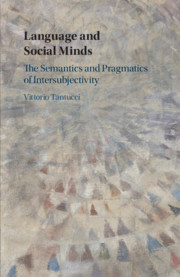1 - The Intersubjective Gradience Model
An Introduction
from Part I
Published online by Cambridge University Press: 26 March 2021
Summary
This first chapter introduces the notions of theory of mind from cognitive psychology and the one of intersubjectivity from linguistics. It introduces the new speaker-centred notion of co-actionality. It provides an overview of the literature of both domains and finally defines the desiderata for a new gradient approach to analyse speakers’ ability to project their interlocutors’ potential reactions to what is being currently said. It lists a number of assumptions that will be discussed and empirically supported throughout the book: (1) Theory of Mind is communicated through overt intersubjective strategies and/or constructions, which vary in degrees of complexity. (2) Intersubjectivity is expressed linguistically as extra-propositional surplus of meaning that is additional to the perlocutionary effects of a linguistic act. (3) There is a unidirectional pathway of increased complexity of social cognition, ranging from co-actionality, to immediate intersubjectivity (I-I) to extended intersubjectivity (E-I). (4) This increasing complexity matches the evolutionary shift from dyadic to triadic and finally to collective intentionality. This cline can be traced both in language change and ontogenetic development. (5) Neuro-typical adult interactionis however includes utterances sometimes underpinning mere co-actionality, yet mostly hinging on immediate intersubjectivity and extended intersubjectivity. (6) Language change is an important indicator of a cognitive tendency toward polysemy and increasingly complex interactional functions that subserve human needs in a community of practice.
Keywords
- Type
- Chapter
- Information
- Language and Social MindsThe Semantics and Pragmatics of Intersubjectivity, pp. 3 - 21Publisher: Cambridge University PressPrint publication year: 2021

